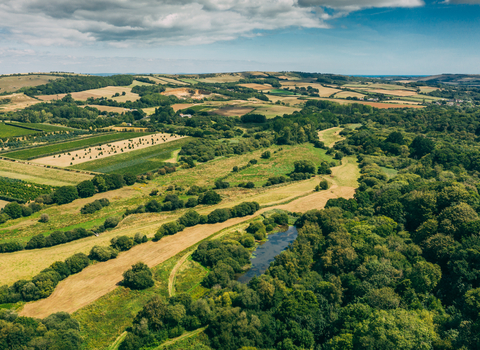Environmental and Sustainability Policy
At the Hampshire and Isle of Wight Wildlife Trust, we realise that in addition to our positive environmental role as a conservation organisation, our work and activities will potentially have other impacts on the environment and climate if not managed effectively. As a result of this, we need to review and alter our behaviours and the way we work in order to conserve energy, minimise our unnecessary consumption of natural resources, reduce all forms of pollution and much more, in order to reduce our impact on the environment.
With current developments in both national and international policies and agreements, the reduction of carbon emissions has been brought to the forefront of the post-covid recovery. It is important that as an organisation working to protect and restore nature and our natural environments, we set a precedent of reducing our emissions and environmental impact that other organisations can follow.
As a result of this, we have set a target to become a climate positive organisation with net negative greenhouse gas emissions by 2030. We will achieve this by ensuring our operations are as low in emissions as possible and delivering a variety of nature-based solutions to reduce our impact on the environment. This will help us manage, maintain and restore our environments as effectively as possible for biodiversity.
We will aim to manage our sites and operations effectively so that they fulfil the following targets which will reduce our emissions and our impact on the environment. Specific actions for each focus area are included in the full version of our policy.
Reducing our carbon footprint as much as we can
We aim to have net negative greenhouse gas emissions by 2030, becoming a climate positive organisation. We will calculate our carbon footprint annually for all our operations, as well as assessing the carbon flux of our landholdings, We will continually work to improve these calculations.

Rain collecting in a garden water barrel © Martin Fredy via Getty Images
Using water & energy efficiently
We will introduce measures to manage our water consumption, such as encouraging staff to reduce their use of treated water and prioritising the installation of water efficiency measures.
We will reduce wastage and increase our reliance on renewables to increase our energy efficiency and maintain a conversation with staff to encourage more effective energy conservation on an individual level.

© Strong Island Media
Managing our buildings and estate efficiently
We will maximise the energy efficiency of our buildings and ensure their functions incorporate the actions of the sustainability policy. New buildings will aim to be built to high environmental standards.
We will ensure that the natural ecosystems are maintained and managed effectively, with the best practices for both nature and climate. The methods used to go about this will be as sustainable and low emission as feasibly possible, using sustainable management methods such as avoiding the use of fertilisers and forecasting a move to electric tools.

Improving our date storage and IT systems
It important we our conscious that our data storage and IT systems will also be having an impact on the environment and actively work with staff to improve data management.

Reducing our reliance on high-emission transportation
We aim to limit the emissions from transport as it contributes significantly to our carbon footprint. To reduce our impact, we will provide tools to staff to help them think about their commuting emissions as well as providing EV charging points to increase the accessibility of electric cars, while forecasting an electric transition for our fleet.

Managing & reducing our waste to landfill
We will reduce, reuse and recycle as much of our waste as we can in order to reduce and ultimately stop our waste going to landfill. This will include composting kitchen and garden waste and ensuring we recycle as much as we can. We will ensure this is taken into account across all our procurement activities.
Applying this across all our procurement and to all fundraising and events
We will maintain this policy for our events and activities and ensure the most sustainable choices are made to minimise the carbon footprint of these activities.
It is important that we aim to ensure that all future aspects of our procurement are done with sustainability as a top priority monitoring which aspects of our procurement need reviewing. We have specific actions for plastics; fuels; food and drink; cleaning products; oils, paints and varnishes; stone, aggregate and other minerals; paper products; non-paper stationary; furniture and office equipment. These are detailed in the full version of this policy.
Communicating our sustainability goals & monitoring progress
We will communicate this policy to ensure transparency in our goals and work to our members and staff, as well as to all those who have an interest. This will include utilising and establishing resources to improve engagement amongst staff and sharing our achievements publicly. We will monitor our impact annually and continually work to improve our data collection method, assessing our progress towards or goals.
Aligning with standards and complying with legislation
We will comply with all legislation relevant to our work and also work to align our activities with the set standards (such as the Science Based Targets Initiative), even if it is not a legal requirement. We will also maintain our practices and buildings, keeping up to date with the most recent environmental standards and codes.
Working with our corporate partners
We will share our progress with our corporate partners and ensure we work with organisations that are actively working towards sustainability goals.
Monitoring our financial policies
We will review the investments made by pension providers and banks used by the trust to ensure that our financial systems have as minimal an impact as possible.

